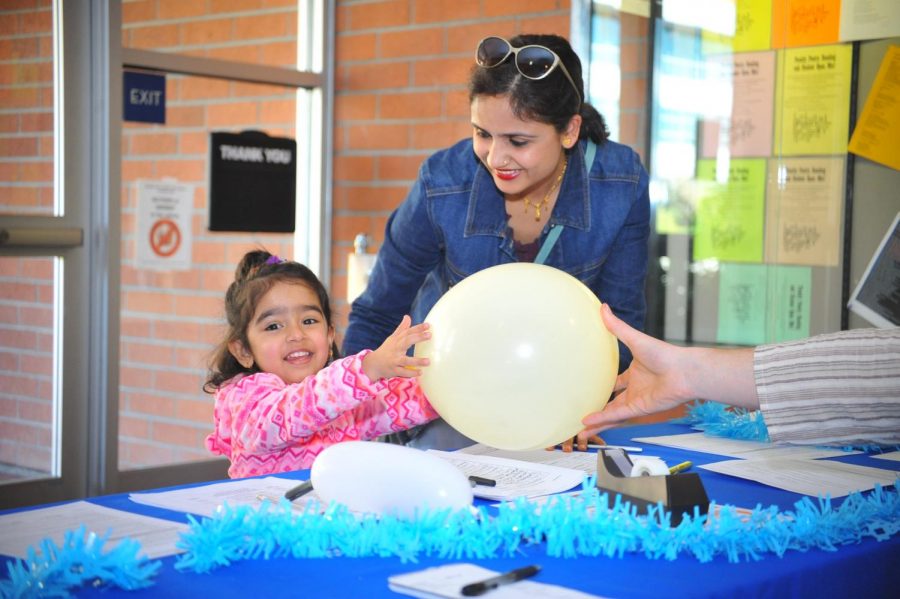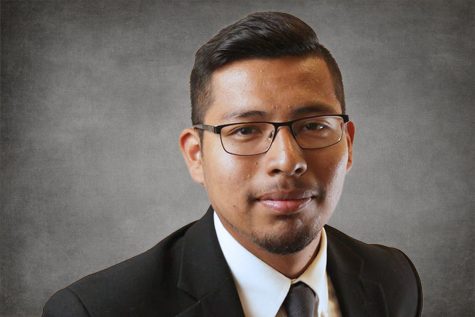Teaching Café refines educational skills, displays campus resources
Debeshi Pantel (left) receives a balloon during the Teaching Café in the Library on Friday. Bantana Pantel (right) brought her daughter to the café to expose her to Contra Costa College and its community.
Apr 24, 2018
Faculty, staff and managers as a function of their occupation take care of students. But it is important as a college community to take a supportive role in cultivating the well-being of students.
Speech professor Sherry Diestler said taking care of community college students means the campus needs to collectively understand all the resources available to students at Contra Costa College.
In hopes of creating a greater awareness of the resource pool on campus, the third Teaching Café, organized by Diestler, hosted tables for Student Life, STEM Center, Per Ankh Academy, La Raza, CCC international students and Veterans’ Resource Center in the Library and Learning Resources Center on Friday.
She said the café is like a flea market of ideas for the entire CCC family.
“Many times, we seek outside speakers to come to CCC and talk to our people. But our people get paid to go out to speak, so it only makes sense that they should speak here to each other too,” Diestler said.
The teaching cafe featured speakers like history professor Manu Ampim, who spoke on effective teaching and the craft of professorship.
Workshops like Chef Nader Sharkes’ cooking demonstration, or John Diestler’s cell phone photography practice, were also presented.
In total, there were 21 tables with different representatives of programs and resources.
Ampim said the café allows teachers on campus to go above and beyond and learn how to better prepare their students inside and outside of the classroom.
Ampim emphasized the need as an instructor to keep an open mind about getting better and listening to what other professors are doing that works.
“More times than not, instructors believe that having a degree means the same thing as being a professor,” Ampim said. “Professors master the craft and meet students where students are.”
He said that part of being an efficient professor means taking an initiative to do original things in their respective field.
Ampim said in his field of Africana studies, he’s experienced 30 years of first-hand research.
Throughout his travels, Ampim gained better insight to share with his students and teach them on a deeper level, more than someone who hasn’t done their own research.
Ampim said although that has gotten him recognition in the intellectual community, students are different.
Ampim’s transition from having an instructor’s mindset to a professor’s mentality happened in 1991 when he came back from researching African artifacts in Europe. He presented his findings at seminars in the Bay Area and, although it was an interesting subject, his cousin respectfully called Ampim’s seminars boring.
At first Ampim said he dismissed the claim as absurd and moved on. However, after watching the video of his seminar, he admitted to himself that he wasn’t teaching in effective way because his audience had changed but he hadn’t.
“I taught in universities where they are note takers and auditory (learners)” he said. “The community college level has visual and auditory learners.”
Ampim said he adapted and incorporated PowerPoint and a more class-engagement model in his classroom lectures.
Diestler said that professors are able to learn from other professors at the café, but the event also allows students to communicate with teachers about how to most effectively teach them.
She said student feedback is very important, yet it is not usually received or looked for by the normal teacher.
Students Janiece Bussey and Jordan Ingalls-Holloway presented student perspectives on best teaching practices to instructors who came to their table during the event. Bussey said the presentation emphasized active student participation.
Bussey said students should socialize during courses in different ways and that online platforms allow students to engage each other and the teacher from anywhere.
In the classroom there should be online groups for students to communicate with each other about the work and give each other feedback.
Ingalls-Holloway said that his success as a student has been greatly affected by social skills he learned in class. He said the networking skills he learned in the classes where his professors would promote discussions to help him get an internship.
He said he hopes his presentation will influence professors in a positive way and hopefully help other students succeed.



